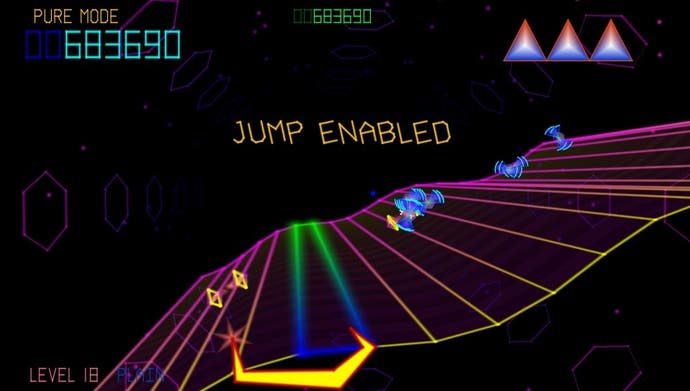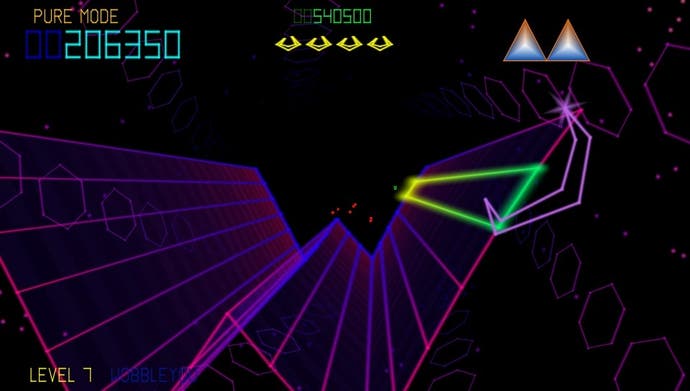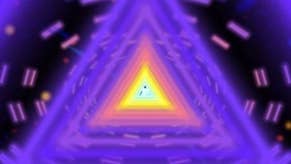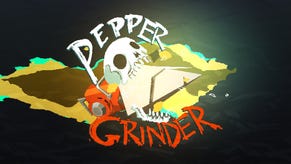TxK review
What's past is prologue.
TxK, a PlayStation Vita shooter that's as crisp as a phosphorous vector line in both style and design, is probably the most high-profile outing for Jeff Minter and Llamasoft since 2007's divisive Space Giraffe - but don't call it a comeback. It's a throwback, sure, a follow-on from Minter's own improvisations upon Dave Theurer's towering 1981 arcade game Tempest with the cult duo of the Atari Jaguar's Tempest 2000 and the Nuon's Tempest 3000. It's a continuation, too, of Llamasoft's fascination with retooling and rebuilding the monolithic classics of the early 80s, an obsession that peaked several times throughout the wonderful iOS games released under the umbrella of the Minotaur Project in recent years.
As retro-chic moves from the leftfield to become the norm thanks to the rise of indie, TxK is above all a reminder that, for Llamasoft and Minter, this isn't an aesthetic to be worn lightly before being tossed aside whenever it falls out of fashion again. Rather, TxK is proof that the smoky netherworld of arcade abstraction and quick-shot adrenaline is one in which Llamasoft outlasts and outclasses the many tourists that pass through from year to year. It's turf Minter has made his own.
And boy does he know the territory well. In every luminous line that makes up TxK's world you can feel the 20 years of study and craft that have preceded this; it's in the perfectly weighted inertia of your craft, as good an approximation of the original cabinet's vertical spinner as you'd ever hope to find on analogue sticks, or in the beautifully pitched pace with which the 100 levels of TxK unfold. There's wisdom in what's been edited out as well, and after the fuzzy constructs introduced by Space Giraffe it's interesting to see that TxK is defiant in its simplicity.

It starts with the art, which evokes the vector style of Theurer's original more keenly than Llamasoft's previous Tempest sequels. The clarity of the Vita's screen helps sell the look, of course, but even putting that aside there's a cleanliness to TxK that lends it a cool razor-edge. There's warmth and colour too, but it firmly exists in the same primal black void from which other classics like Defender, Asteroids and Robotron exuded their own strange light.
That same simplicity carries through to the mechanics, which restore the fundamentals first introduced in 1994's Tempest 2000, itself a close student of Theurer's original template. The essentials haven't changed - you're still guiding a claw across the lip of a variety of tubes that stretch towards nothingness, clearing lanes of enemies in order to progress to the next level - and many of the kinks stay in place. It's still about marshalling space, and about trying to keep hostiles out on the horizon where they yield higher scores.
The tools have stayed the same, too. You start each level naked, grasping at power-ups to get more effective armaments, acquire a droid companion or get access to a jump that lets you free yourself from the grid and clear any hostiles hovering around the rim. There's one new addition to the arsenal for TxK, an ability to lean into adjacent lanes by holding down the left shoulder that turns out to be the perfect way to deal with enemy ships that have encroached your space.
With so much the same and very little that can claim to be new, what makes TxK so special? It's the endless energy, and the feeling that every element in TxK's design has been iterated towards the point of some kind of perfection. It's the hit-pause that happens the instant you collide with an enemy, giving you a brief window to unleash a supertapper smart bomb that clears the screen and pulls you back from the brink of oblivion. It's the respite offered by inter-level intervals where you guide a light through a succession of loops, or the bonus levels that have you languidly gliding through space, all key counterpoints that complement TxK's heady rhythm.
"TxK firmly exists in the same primal black void from which other classics like Defender, Asteroids and Robotron exuded their own strange light.

It's the abundance of character found in TxK's abstract world, whether that's the AI droid that trails you like an eager beagle, occasionally rushing in to rescue you from sure-fire death, or the merry march of the cannon fodder and the searing menace of un-tended crystal stems that threaten to kill you as you exit a stage. It's the Speak & Spell sound effects, and that adorable layer of Minter eccentricity.
It's also the sense that with TxK Llamasoft has perhaps found the greatest vessel for earning the wider love the developer's always deserved. The Vita might remain a niche machine, but compared to the Jaguar and Nuon it's positively mainstream, a factor met by the accessibility of TxK. The polished frankness is one thing, but a neat system that allows you to gradually best your score level by level breaks down the action into sizzling, digestible chunks makes the perfect concession to portable play and less time-rich players.
There's a Pure mode for the purists that's a straight slog through the 100 levels, and a Survival mode for anyone who thinks the idea of being granted extra lives through the course of play is a little gauche. Those that power their way to the top of the online leaderboards might debate whether this or Space Giraffe is the better game - whether slightly frayed psychedelia and a cider glass full of ideas wins out over studied simplicity - but that's an argument for another day. All you need to know right now is that TxK is Minter at his finest, and it's absolutely mint.










